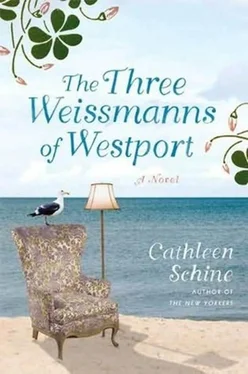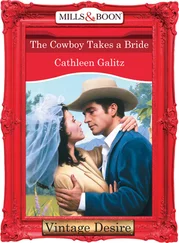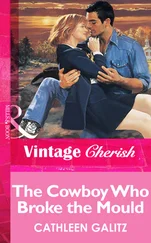And so it was decided. Joe would be generous and keep the apartment.
Betty had been married before she met Joseph Weissmann. Her first husband had died suddenly and young in an automobile accident, leaving her with two little girls, Annie, age three, and Miranda, two months. Joseph came into their lives not quite a year after the accident. He married Betty, and though they ate dinner in the kitchen before he came home from work and never saw him on the Saturdays when he went to the office, the girls took his last name, called him Josie, considered him their father, and loved him as if he were.
When Annie got the phone call from her mother announcing Joseph's discovery of irreconcilable differences after almost fifty years, she immediately urged a visit to a neurologist. Had Josie been complaining of headaches? Erratic behavior, headaches, dizziness: Of course it was a brain tumor. Did her mother remember her friend Oliver from graduate school? He died just like that. Betty had better get him to a doctor that day. Poor Josie.
"It's not a brain tumor," her mother said. Joseph was feeling better than he had in years. "And you know what that means."
Annie grudgingly accepted what her sister, Miranda, understood immediately.
"He is in love," Miranda said when Betty called her to tell her the news.
"I'm afraid he must be," Betty said.
The two women were silent. They were both believers in love. This love was heresy.
"What does Annie say?"
"She's going to speak to him. And she suggested I get a lawyer."
"A lawyer?" Miranda's voice was disapproving. "What does Josie say about that?"
"He suggested we use a mediator."
"This is not really happening," Miranda said.
And she, too, decided to see Josie.
"I am entitled to live my life," Joseph told them when they appeared together at his office. But there were tears in his eyes. "I am entitled to my life."
Both women were moved by the tears. And both agreed that he was entitled to his life, but with these provisos: Annie explained that the life Josie was entitled to was the life he had always lived, the one with their mother; Miranda, a more romantic soul, pointed out that while life must be lived to the fullest, Josie was no longer young, and his present life was surely full enough for someone his age.
"This is difficult for me, too," Joseph said. He squeezed his fists into his eyes like a child. The two women put their arms around him.
"Josie, Josie," they said softly, soothing the distinguished man in his pinstriped suit. They had never seen their stepfather cry.
He stood back and looked down at his two daughters, his "girls," and he saw that his girls were no longer girls. Miranda was as lovely in her skittish, eye-flashing way as ever, her light brown hair shining, grazing her shoulders, the style not much different from what she wore as a teenager. But now in her still-youthful beauty there was something willed and hard. As for Annie, she had never looked youthful, always so serious, her dark eyes taking everything in and giving nothing back. He could see a faint line of gray where her hair parted. She watched him anxiously. What could he do for her, his sad little girl? Decades ago, in his youth, a man in his position might have handed her some bills and told her to buy herself a hat to cheer herself up. He imagined her in a little velvet cocktail hat, inclined rakishly to one side. The incongruity of it made him want to shake her.
"I will be very generous to your mother," he said. "You can count on me for that."
And the daughters left the office, angry, disappointed, but hopeful for their mother's material comfort, at least.
"Hi, Felicity," they said with forced cheerfulness to the pretty VP who had initiated the increasingly successful online side of the business. There was no point in letting their misery show. Perhaps the whole thing could be patched up before Felicity and the others in the office knew anything about it.
"Well, at least they're not getting lawyers," Miranda said. "Lawyers are parasitic vultures."
"You're mixing unpleasant species characteristics."
"Vermin," Miranda said defiantly. Miranda was a literary agent and resented the legal profession on principle for interfering in matters that ought not to concern them, like her clients' contracts, but her experiences with lawyers had been particularly painful in the last six months. "They should mind their own business."
"Unfortunately, divorce sort of is their business. Some of them anyway."
Miranda had never been divorced herself. This, she knew, was only because she had never been married. She fell in love too easily, too frequently, too hard, to get married. Miranda loved to be in love. It was a pleasure she was willing to suffer for, but not give up. Right now she was in love with a ne'er-do-well day trader. She thought of him and felt a flutter of giddy admiration: his bare back bent over her computer in her dark bedroom late at night, the pained expression on his face illuminated by the big, bright monitor.
Love was one of the reasons she gave for never getting married, the primary one. But there was another. She had always been too busy, constantly on the phone, barking out orders to her harassed assistant, flirting with a publisher on the hook, raising the spirits of a disappointed author. She specialized in the genre of what Annie dubbed the Lite Victory memoir. Her clients, the Awful Authors, as even Miranda called them, had always overcome something ghastly and lurid, something so ghastly and so lurid they had to write a ghastly and lurid book recounting every detail of their mortification and misery. At the end of the book, there was a nice epiphany, and since no one could really object to an epiphany, not even Annie, the books were very popular and Miranda had built a thriving agency that required her constant attention.
Until the lawyers got to it, she thought. "Vermin," she said again. "Ha! No divorce lawyer will ever dine on my flesh."
Annie said nothing. Miranda's antipathy to marriage was a point of contention between them. Annie had always maintained that Miranda simply lacked the imagination to get married.
"Marriage is too much like fiction for you," she once told Miranda. "Too unpredictable, too influenced by idiosyncratic characters."
Miranda, who considered herself a hopeless romantic, had replied, "Fiction has a plot, the same old plot. In what way is that unpredictable?"
"Because it all hangs on temperament, on personality, on serendipity and happenstance. On chance. Your books, and all your love affairs, are about control, losing it and then reasserting it."
To which assessment of the genre of memoir and the miracles of the heart Miranda would shake her head, smile pityingly at her benighted older sister, contemplate her puzzling insistence on always wearing such drab colors, and say gently, "I want to be free, Annie. And I am."
Then, invariably, the sisters would quote Louisa May Alcott at each other-"She is too fond of books, and it has turned her brain"-and move on to other things.
Now, as Miranda walked beside her sister, she wondered if Josie wanted to be free, free of Annie and herself. As well as their mother, of course.
"It's so sad," she said. "Lawyers would make it ugly, too."
She felt her phone vibrating. When she saw who it was, she didn't answer.
"Christ," she muttered, but Annie didn't hear her.
"And expensive," Annie was saying. "They make it so expensive." That had certainly been her experience. She had been married, many years ago. She had two grown children to prove it. But her husband, such an intense, driven young man, had turned out to be a gambler. Annie hadn't seen him after the divorce, eighteen years ago, nor had he kept in touch with his children. She had been informed of his death, of leukemia, two years ago. "Nothing lasts," she said now, thinking of the waste that was love.
Читать дальше












